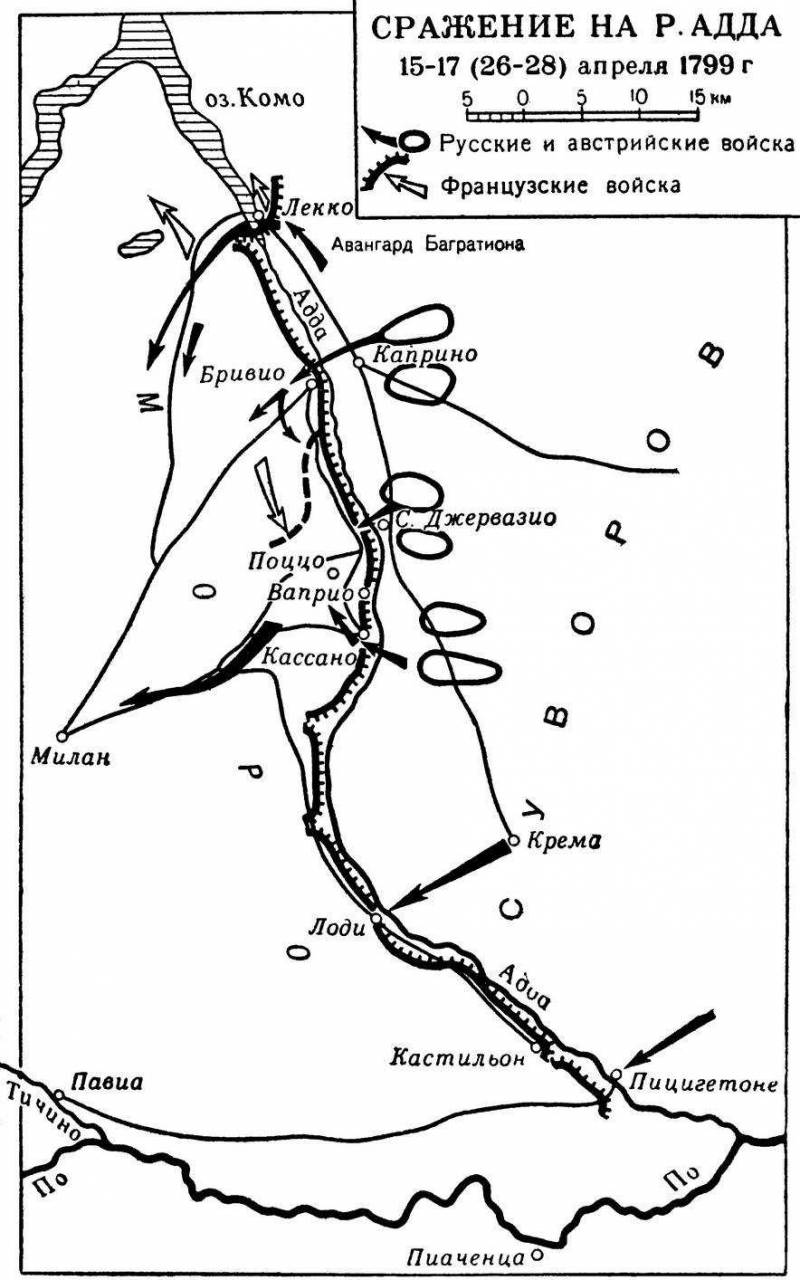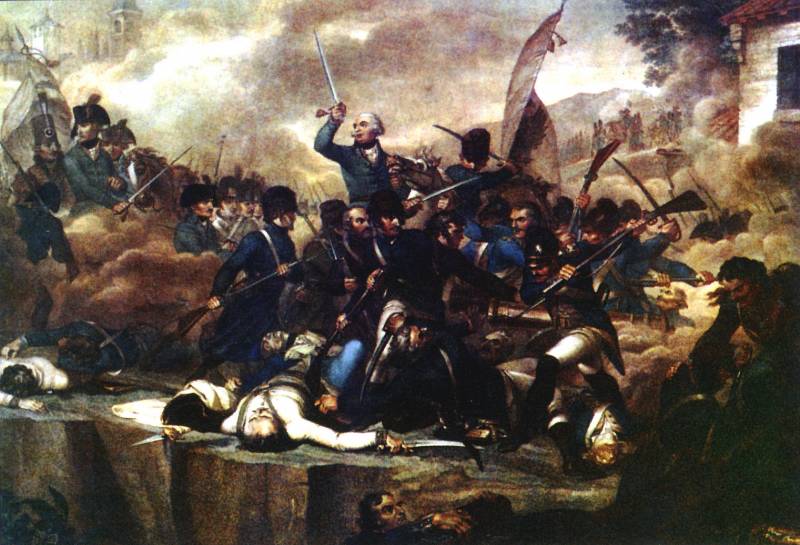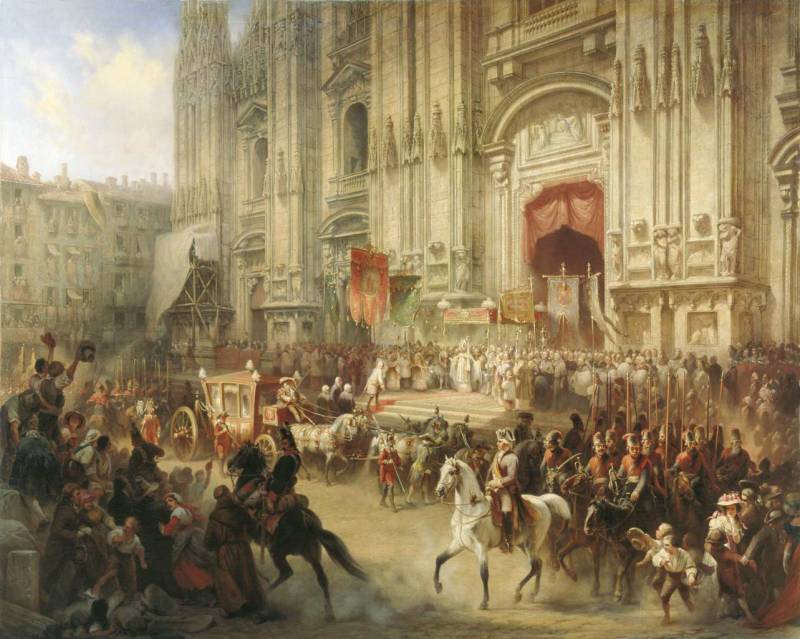Victory of Suvorov on the Adda River
The situation before the battle
In 1798, the government of Emperor Paul I decided to oppose France, joining the ranks of the Second Anti-French Coalition. The Black Sea squadron under the command of F. F. Ushakov was sent to the Mediterranean to help the allies: Turkey and Britain.
In the land theater, the Allies planned to launch a large-scale offensive in 1799 — in the area from Holland to Italy. Russian troops together with the allies were to operate in Holland, Switzerland and Italy. In Italy, the allied Russian-Austrian army was to be headed by Alexander Suvorov. The Austrian military-political leadership formally agreed with the independence of the Russian commander, but tried to impose his strategic plan on him, which was based on the defense of the borders of Austria. Suvorov also planned to act in his own style, quickly and decisively. To carry out a decisive offensive in Northern Italy, to liberate Lombardy and Piedmont from the French. To create in Italy a strategic base for striking France through Lyon to Paris.
3 (14) April 1799, the year Suvorov arrived at the camp of the allied forces in the city of Verona. He published a manifesto in which he announced the restoration of the old order in Italy. When Rosenberg's corps approached, having more than 48 thousand soldiers (12 thousand Russian and 36,5 thousand Austrians), Suvorov decided to launch an offensive, regardless of the instructions of the gofkryssrat. 8 (19) April commander launched an offensive by the main forces from Valeggio on Addu. For the blockade of the fortresses of Mantua and Peschiera, the 15-thousandth corps of the Austrian General Kray was left.
French forces. Allied offensive
The French army, commanded by Scherer, after an unsuccessful offensive and defeat by the Austrians at Magnano, withdrew its main forces to defend the west bank of the Adda River. However, two divisions (about 16 thousand people) were delayed, so the crossing at the front of about 100 km was defended by 28 thousand French soldiers. The French had a strong natural position: the Adda River was quite deep, it was impossible to ford it. The right bank was higher than the left, that is convenient for shooters. In the upper part of the river, from Lake Como to Cassano, the banks were high, steep; Below Cassano - the coast became low, swampy, the river itself disintegrated into sleeves, which made it difficult to cross. The bridges at Cassano, Lecco and other crossings were well protected by the French. When the Russians approached, the French blew up the bridges.
Suvorov, by attacking Brescia, Bergamo and Lecco, secured its right flank by contacting the Austrian forces in Tyrol and trying to bypass the enemy army from its left wing, and then continue to move south-west, crowding the enemy towards the Po River. In the forefront was Bagration (3 thousand people) and the Austrian division of Ott. For the avant-garde followed the main forces of the Austrians under the authority of Melas. The Hohenzollern Division (6,5 thousand people) occupied the left flank and moved through Pozzola to Cremona. She was supposed to provide the left flank of the army against a possible enemy flank attack. 10 (21) April Allies took the fortress of Brescia, 13 (24) April - Bergamo. 14 (25) April Allied forces reached the Adda River.
At the same time, Suvorov was displeased with the allies. The Russian commander acted quickly and decisively, he did not tolerate delays. The troops performed at night, made frequent short halts. For 14 hours the army had to go to the 30 version. True, it was not always possible to withstand such a pace of movement, sometimes the roads were too complicated. The Austrians are not accustomed to this and began to complain about the big transitions and the speed of the marches. This irritated Alexander Vasilyevich. So, he arranged for the Austrian commander Melas himself to be dragged out, who gave the troops a good rest after a long march in the rain, which disrupted the army’s schedule. Suvorov wrote to Melas: “Women, beauties and sloths chase after good weather ... who is in bad health, he should be left behind ... In military actions, he should be quickly figured out - and immediately executed, so that the enemy would not have time to recover himself ... Eye, speed, onslaught ... "Next, Suvorov tried not to mix Russian with Austrian parts. An exception was made only for the Cossacks, who conducted reconnaissance and security ahead of the Austrian columns.
Having reached the Adde river, the Russian commander-in-chief decided to break through the enemy defenses on a broad front, striking at the Lecco-Cassano sector. Suvorov decided to deliver the main attack on the section Brivio (Brevio) - Trezzo, auxiliary - in Lecco. The overall task: to force the river and take Milan. In the event of a delay in the crossing at the designated areas, it was decided to force the river at Cassano, followed by an offensive in the Milan direction. The left-wing division of the Hohenzollern was given the task of forcing Addu from Lodi and acting in the direction of Pavia.
The main forces of Suvorov’s army, which included Rosenberg’s Russian corps and Austrian divisions of Vukasovich, Ott and Zopf (totaling about 27 thousand people), were to force a water barrier on the Brivio, Trezzo sector and then develop an offensive on Milan. The detachment of Bagration (3 thousand people) acted on the auxiliary direction near the city of Lecco. The divisions of Keith and Fröhlich (13 thousand people) remained in the reserve of the allied army in the area of Trevilio, which were oriented toward the crossing at Cassano.
Battle of the Adda River
The first to go on the attack was 15 (26) on April 1799, Bagration's unit at Lecco. This strike was supposed to mislead the enemy, to divert them from the direction of the main strike. The city of Lecco, located on the left (east) shore, defended the 5-thousandth of the French garrison of General Soye with 6 guns. In this case, the French occupied the dominant heights. As a result, the French, having a strong position and advantage in strength, fought fiercely. The fight lasted 12 hours. First, the miracle bogatyrs of Bagration with a powerful attack knocked the French out of the city. The French retreated to the northern outskirts of Lecco. But they quickly came to their senses, and finding more of them, they went to the counterattack. By evening, the enemy began to take up. Bagration requested reinforcements. Three battalions under the command of Miloradovich and Povalo-Shveikovsky helped Bagration's group turn the tide and go on the offensive again. By 20 hours, Russian soldiers captured Lecco, throwing the enemy far to the north. The French soldiers retreated beyond the Addu and blew up the remaining crossings. The French lost about 1 thousand people in this hot fight, our total losses are 365 people.
On the same day, the French changed their commander - Scherer was replaced by General Jean Victor Moreau. He was considered one of the best generals of France. The new commander made a regrouping of forces. He planned to assemble the main forces in the Trezzo and Cassano area. That is, he generally correctly identified the area where the allies dealt the main blow. This allowed the French to strengthen the defense.
However, Bagration’s demonstrative strike was useful. The division of Seryurye, which moved from Lecco to Trezzo, reached the place, and then it was turned back. Only one battalion was left at Trezzo. In this case, the French believed that forcing the river in this place for the whole army is impossible. The east bank here was steep, which made the descent of the pontoons and troops to the river extremely difficult. Therefore, the French did not set up even guard posts here. At the same time in this place the width of the river was smaller and the west bank was convenient for disembarking. Therefore, Suvorov ordered to direct the crossing in the Trezzo area.
On the night of 15 on 16 on April, Ott's pontooners began to build a bridge. By the morning of April 16 it was erected. The first to cross the river was Ott’s avant-garde, followed by the Cossack regiments of Denisov, Molchanov and Grekov, then the main forces of the Ott division. After that, the river crossed part of the division of Zopf. As a result, the appearance of Austrians and Russian Cossacks in Trezzo came as a complete surprise to the enemy. Only the slowness and caution of the Austrians saved the French battalion in Trezzo from immediate destruction. The French managed to prepare for the defense of the settlement. However, the Cossacks bypassed Trezzo from the north, and their attack broke the resistance of the enemy. The French fled to Pozzo. Thus, thanks to the successful crossing of the Adda y Trezzo, the defense of the French army was hacked.
The French command ordered the division of Grenier to take up defense in the Vaprio-Pozzo sector with the front to the north and meet the Austrians advancing from Trezzo. Ott's division failed to break the resistance of the enemy and, under pressure from the French, rolled back to Trezzo. Austrian troops showed their weakness in the actions on the basis of columns and loose order. The battle with Vaprio continued. The Austrians led both divisions into battle - Ott and Zopf. However, the French continued to attack. Only the strike of the Russian Cossack regiments from the Pozzo region under the general command of Denisov broke the resistance of the enemy. The French began to retreat. After that, the Cossacks of Denisov attacked the cavalry-chasseurs regiment of the French who approached from Gorgonzola and broke it. Moreau ordered the Grenier division to retreat to the Cassano-Inzego line.
On the same day, Alexander Suvorov threw his reserve into battle - the division of Fröhlich and Keith (under the general command of Melas). They were to conduct an offensive from Trevilio on Cassano, force the river at Cassano, then go to Gorgonzola. This led to the dispersal of the French forces. Also flank attack allowed to surround and destroy the main forces of the French army. However, these were Austrian divisions, not Russian, they did not know how to fight in Suvorov style. For seven hours, the Austrians fought a single French semi-brigade (2 thousand soldiers) and could not defeat it. The French successfully defended Cassano from the troops of Melas. Suvorov had to personally arrive at this section of the front. In the meantime, the French garrison of Cassano was reinforced by the Arno brigade from the Victor division. Suvorov made a regrouping of troops, put out a 30-gun battery and launched a new offensive. After that, the French trembled and retreated to the right bank of the Adda, failing to destroy the bridge. At about 18 hours, the Austrians occupied Cassano.
Seeing that the defense was broken, Moreau ordered the army to retreat to Milan. An attempt by the French commander to organize resistance at Trezzo and Cassana failed. Thus, the Russian-Austrian troops broke the resistance of the French army at the turn of the Adda, forcing the river at the front in 55 km. However, it was not possible to surround the main forces of the Austrians due to the weak tactical training of the Austrian troops. Burnt Austrians almost did not pursue the enemy. The French were persecuted only by the Cossacks. 17 (28) April allies crushed the resistance of the last hotbeds of resistance of the enemy. Troops of Vukasovich and Rosenberg defeated parts of the Seryurie division. The French general lost contact with Moreau and did not know the general state of affairs, spent the night. As a result, was captured. Soon Suvorov let him go on parole.
Battle on the Adda River 16 (27) April 1799 Engraving by N. Sciavonetti by Singleton
Results
The French army was defeated and fled. The French lost killed and wounded 2,5 thousand people, prisoners - 5 thousand, 27 guns. Our losses - 2 thousand dead and wounded.
The battle stands out because the crossing of the river on such a wide front was a novelty in the art of war of the time. The front of the enemy was broken by a blow of concentrated forces on the main line during active attacks from the flanks, which disoriented the enemy. In this case, Suvorov was able to achieve victory mainly using Austrian troops.
The road to Milan was free. The city was supposed to defend the Seryurye division, but it was already broken. Therefore, in the evening of April 17 (28), the Cossacks entered Milan. 18 (29) April, the Russian commander-in-chief Alexander Suvorov arrived in the city. The Italians greeted him with great enthusiasm as a savior and savior. Following Milan, the Allies occupied the cities of Tortona, Marengo and Turin. Suvorov’s strategy of crushing the main forces of the enemy army in the field fully justified itself. In a short time, all of Northern Italy was liberated from the French. The remnants of the French army were blocked in Mantua, Alexandria, the strongholds of Tortona and Turin. The main forces of the French retreated to Genoa.
However, Suvorov’s success alarmed Vienna. On the one hand, the Austrian high command was quite victories for the Russian commander. On the other hand, the Austrians feared the independence and determination of Alexander Suvorov. They wished the Russian commander to stop, take up the defense of Northern Italy and restore Austrian rule there. Therefore, the Austrian troops were ordered to disarm the Italians, to crush the national liberation movement. Suvorov was against it. Therefore, the Austrians decided that Suvorov should be removed from Italy, since his presence there is dangerous.
Suvorov's entry into Milan. Artist A. Charlemagne, ca. Xnumx



Information